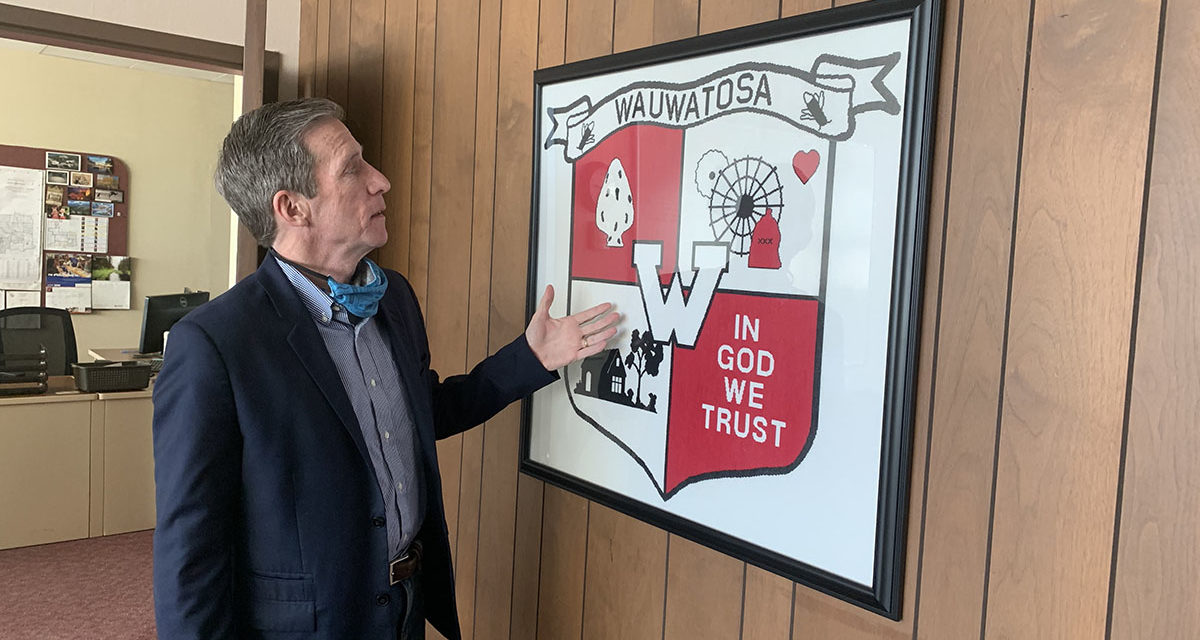by Rick Romano
Tosa Connection reached out to Mayor McBride to get his views on recent issues facing the city. Here is a recap:
On the Common Council’s decision to not decriminalize marijuana possession.
“I don’t think it changes anything,” McBride said. “There is general support (to decriminalize) minor use, it’s above our authority. We can’t criminalize or decriminalize.”
McBride said he favors communicating the council’s leaning to the state Legislature.
“I think it would have been better to create a resolution and send it to the Legislature,” he said. He noted, however, that “we send resolutions to the Legislature all the time and, unfortunately, they are largely ignored.”
On the prospect of a proposed citywide gun buyback.
 McBride pointed out that Ald. Lowe brought this up and said it had good intentions.
McBride pointed out that Ald. Lowe brought this up and said it had good intentions.
“The problem is that there are 350 million guns in this country, one for at least every person,” McBride said. “Even if we bought back one gun per resident here, are you buying guns from good guys or bad guys?”
He said he is interested in proposals that wind up being more than displaying good intentions, so he has asked Ald. Lowe to come back with a measure that would have a better result as well as outlining how the program would be run.
“I certainly support the suppression of guns if there is a mechanism for funding, such as hospital foundations or some other source,” he said. “There are questions about staffing as well as funding.”
About how future development will be allowed, including zoning changes as well as how the community can be more welcoming to future residents.
“In general, zoning has to be changed regularly,” McBride said. “But no one wants to change our wonderful older neighborhoods. Part of the intent is to separate our industrial and residential areas.”
He noted that much of the zoning laws dating back to the early 1900s intended to keep certain populations – in particular, a Black population – out of the community.
“We have a history of using zoning principles to make sure any vestige of discrimination is removed from our code,” McBride said.
He said the city’s popularity has created actual shortages of multifamily housing, noting that the current 1.8 percent vacancy is well below what McBride termed a healthy 5 to 8 percent vacancy rate. Much of that has to do with the needs of younger people and smaller households as well as the attraction to the regional medical center. He said the city’s zoning also has been modified to allow for the “reasonable modification” needs of the disabled.
“The main thing is, in all of the things that we are doing, we are preserving the very best of our residential areas, in particular our great older neighborhoods.”
On the ongoing lawsuit by multiple plaintiffs over the way the city handled the 2020 BLM protests:
McBride defended the city’s actions in preserving peace during that year’s protests, noting measures were taken to adhere to ACLU guidelines while attempting to protect business and residential property.
“As an attorney, I reminded people of what you can do legally and there are Supreme Court guidelines” McBride said. “When you drive on peoples’ lawns, shine strobe lights in peoples’ houses and carry guns, you will be arrested.” He also noted there were days and hours that were for legal protesting.
“What would have happened if someone had died like they did in Kenosha?” he said. “That would have been on my conscience. Eight blocks burned down there and that did not happen here. There was no substantial damage. We protected lives and property.”
He noted that both right and left extremes were not happy with him, but the middle majority of residents and others thanked him. He said he is confident that any future judgment will come down in favor of the city.
Looking to the future…
As he looks at the end of 2022 and into the early part of 2023, Mayor McBride said one of the biggest challenges will be the “broken” Wisconsin municipal financing system, which is limited due to capping a municipality’s ability to raise property taxes.
“We, like every other municipality, are dependent on property taxes to provide service including fire and police departments,” McBride said.
But there is a positive, he noted. “We are a magnet for development, but of course some development causes controversy,” McBride said.
He added that when considering taxes against costs to maintain, multifamily apartment developments are a net positive because apartment residents use less city services.
“There will always be change, but we are always trying to find ways to minimize change,” McBride said. “And we focus on getting our residents to accept change.”





